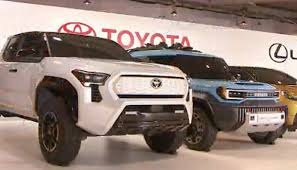In response to growing criticism that Japan’s top manufacturer needs to do more to combat climate change, Toyota announced on Tuesday that it has ambitious plans for battery electric vehicles, including the production of an all-solid-state battery.
Toyota Motor Corporation hopes to have a solid-state battery on the market by 2027. The business said in a statement that the charging period, which is currently one of the biggest downsides of electric vehicles, will be reduced to 10 minutes or less.
By increasing its battery EV assortment and advancing technologies, it intends to produce 1.5 million electric vehicles by 2026.
“With the evolution of the vehicle’s operating system, the next-generation battery EV will also enable customization of the ‘driving feel,’ with a focus on acceleration, turning, and stopping,” it stated.
EV owners typically leave their cars plugged in overnight to recharge and have charging stations in their houses. Toyota has long claimed that hybrids are a better solution, and this is one of the key reasons for this. A hybrid car has both an electric motor and a gasoline engine, and it recharges as it travels.
According to Toyota President Koji Sato, the corporation must make up ground after falling behind in the EV market. At a shareholders meeting scheduled for Wednesday in Toyota City, central Japan, the automaker is sure to receive strong criticism regarding its commitments to combating climate change.
In its most recent announcement, Toyota stated that it was also striving on innovating lithium-ion batteries; the battery type currently used in the majority of EVs and wanted to provide new, reasonably priced possibilities.
Toyota claims to be dedicated to a “hydrogen society” and is still developing hydrogen-powered models, such as fuel cell cars.
Although it can be produced using renewable energy, hydrogen is still expensive and often produced using fossil fuels. Toyota claimed to be collaborating with a number of partners to manufacture cleaner and less expensive hydrogen.
Second-generation biofuels are something that Toyota, which also produces the Prius hybrid, Camry sedan, and luxury Lexus cars, is focusing on. Though they have additional disadvantages, biofuels like ethanol are thought to be more renewable than fossil fuels.

















